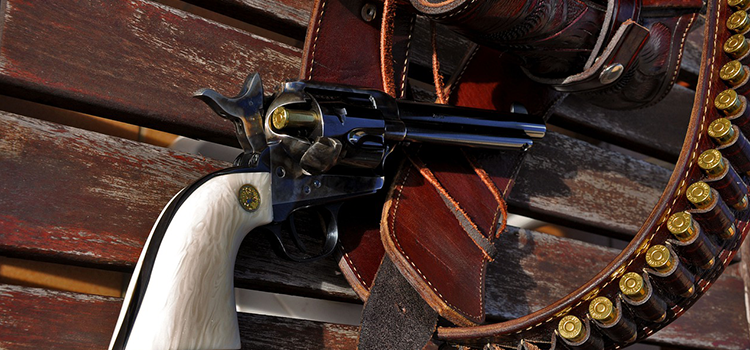Presser v. Illinois – The Court’s Original Second Amendment Case
Historical
In Presser v. Illinois, 116 U.S. 252 (1886), the U.S. Supreme Court first considered the Second Amendment. It held that the Second Amendment prevented the states from “prohibit[ing] the people from keeping and bearing arms, so as to deprive the United States of their rightful resource for maintaining the public security.”
Facts of the Case
Herman Presser was indicted on September 24, 1879, in the criminal court of Cook county, Illinois, for violating article 11 of the Military Code of that state, which prohibited parading with arms by groups other than the organized militia.The indictment specifically alleged that Presser “did unlawfully belong to, and did parade and drill in the city of Chicago with an unauthorized body of men with arms, who had associated themselves together as a military company and organization, without having a license from the Governor, and not being a part of, or belonging to, ‘the regular organized volunteer militia’ of the State of Illinois, or the troops of the United States.”
A motion to quash the indictment was overruled. Presser then pleaded not guilty. After both parties waived a jury trial, the court found Presser guilty and sentenced him to pay a fine of $10. Presser appealed his conviction, arguing that the Illinois statute violated the Second Amendment. Presser specifically argued that the statute was void because its enactment was the exercise of a power by the legislature of Illinois forbidden to the states by the constitution of the United States.
Supreme Court’s Decision
The Court upheld the Illinois statute. “We think it clear that the sections under consideration, which only forbid bodies of men to associate together as military organizations, or to drill or parade with arms in cities and towns unless authorized by law, do not infringe the right of the people to keep and bear arms,” Justice William B. Woods wrote on behalf of the unanimous court. “But a conclusive answer to the contention that this amendment prohibits the legislation in question lies in the fact that the amendment is a limitation only upon the power of congress and the national government, and not upon that of the state.”
In reaching its decision, the Court reaffirmed its holding in United States v. Cruikshank, 92 U.S. 542 (1876), that the Second Amendment serves only as a restraint upon the federal government and not the states. Justice Woods explained:
It is undoubtedly true that all citizens capable of bearing arms constitute the reserved military force or reserve militia of the United States as well as of the States, and in view of this prerogative of the general government, as well as of its general powers, the States cannot, even laying the constitutional provision in question out of view, prohibit the people from keeping and bearing arms, so as to deprive the United States of their rightful resource for maintaining the public security, and disable the people from performing their duty to the general government. But, as already stated, we think it clear that the sections under consideration do not have this effect.
The Court expressly rejected Presser’s contention that there was a right to assemble, drill, or march in a militia absent authorization by state or federal law. Justice Woods wrote:
The right voluntarily to associate together as a military company or organization or to drill or parade with arms, without, and independent of, an act of Congress or law of the State authorizing the same, is not an attribute of national citizenship. Military organization and military drill and parade under arms are subjects especially under the control of the government of every country. They cannot be claimed as a right independent of law. Under our political system they are subject to the regulation and control of the State and Federal governments, acting in due regard to their respective prerogatives and powers. The Constitution and laws of the United States will be searched in vain for any support to the view that these rights are privileges and immunities of citizens of the United States independent of some specific legislation on the subject.
While the decision in Presser is considered a Second Amendment case, it also reflects the Court’s prior interpretation of the whether the Fourteenth Amendment applied the Bill of Rights to the states.
Previous Articles
SCOTUS Decision in Bowe v. United States Is First of the 2026 Term
by DONALD SCARINCI on February 5, 2026
In Bowe v. United States, 607 U.S. ___ (2026), the U.S. Supreme Court held that Title 28 U.S.C. § ...
SCOTUS Rules State Can’t Immunize Parties from Federal Civil Liability
by DONALD SCARINCI on January 29, 2026
In John Doe v. Dynamic Physical Therapy, LLC, 607 U.S. ____ (2025) the U.S. Supreme Court held that...
Supreme Court to Address Racial Discrimination in Jury Selection
by DONALD SCARINCI onWhile the U.S. Supreme Court has concluded oral arguments for the year, it continues to add cases t...
The Amendments
-
Amendment1
- Establishment ClauseFree Exercise Clause
- Freedom of Speech
- Freedoms of Press
- Freedom of Assembly, and Petitition
-
Amendment2
- The Right to Bear Arms
-
Amendment4
- Unreasonable Searches and Seizures
-
Amendment5
- Due Process
- Eminent Domain
- Rights of Criminal Defendants
Preamble to the Bill of Rights
Congress of the United States begun and held at the City of New-York, on Wednesday the fourth of March, one thousand seven hundred and eighty nine.
THE Conventions of a number of the States, having at the time of their adopting the Constitution, expressed a desire, in order to prevent misconstruction or abuse of its powers, that further declaratory and restrictive clauses should be added: And as extending the ground of public confidence in the Government, will best ensure the beneficent ends of its institution.





